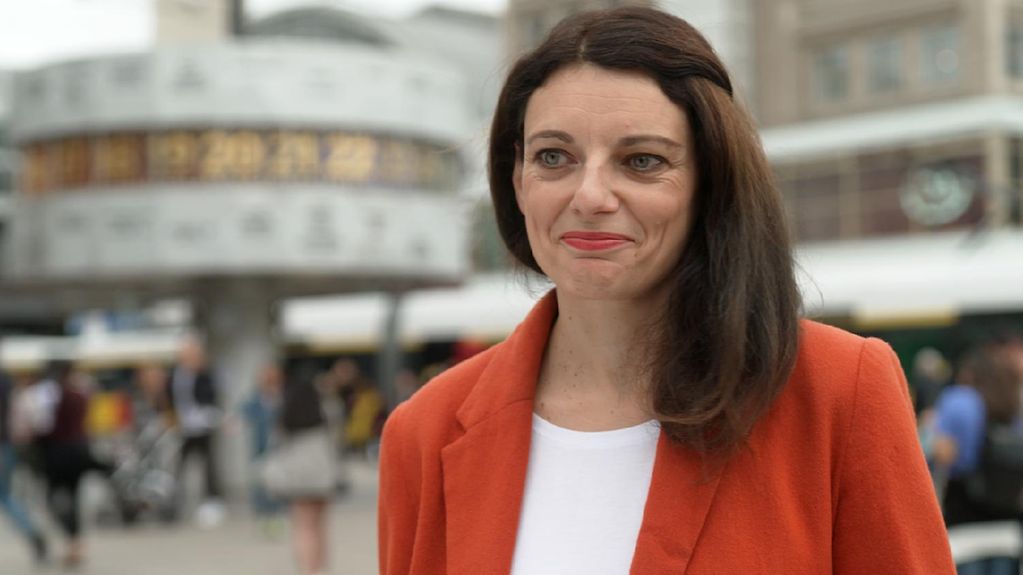Slovenian perspective on 30 years of German unity
"Globally unique" is how the Slovenian TV correspondent Polona Fijavž describes the united Germany. Then, as now, she sees solidarity as the key: only through solidarity can Europe cope with the challenges of the coronavirus pandemic and also continue to grow together. In an interview, she calls on Germany to continue defending the values on which Europe has been built.
4 min reading time

Since 2015, Polona Fijavž has been the Berlin correspondent of RTV Slovenia, the Slovenian public television and radio broadcaster.
Photo: Screenshot/Bundesregierung
What is the first thing that you think of when you think of Germany – is there a personal anecdote you associate with our country?
Polona Fijavž: When I think of Germany, the first thought is of responsibility, the awareness of the importance of each individual, and the respect for and from each other. I think of how punctual the Germans are – with the exception of the trains. And how they know what they want, and how they work towards this.
However, I still think it's funny how the Germans plan everything well in advance, months, years, even decades beforehand. But even the Germans couldn’t plan the reunification.
How do you experience united Germany after 30 years of reunification?
Fijavž: Even today, I experience the united Germany as totally globally unique. What belongs together has still not quite grown together. But only those who have deep insight can notice a difference. I believe that the former East Germans, the older generations, still have difficulties fitting in, because West Germany has virtually taken over their country. Nevertheless, it is amazing how they have managed to synchronise themselves with a completely different system.
And the key at that time was solidarity. Germany recognised this, and has transferred it to the European level. This is also apparent, for example, with the current coronavirus crisis: only solidarity can bring Europe closer together. I think this is very important, because Germany plays an important role in Europe. German politicians are in a position to change the tone. Instead of defending national self-interests, they pursue an ambitious policy for Europe. What began on a smaller scale with East Germany – namely, what belongs together, grows together – is now growing together further in Europe.
In your opinion, what effect did the reunification of Germany have on Europe?
Fijavž: The reunification of Germany has shown us all something important: regardless of the nature or extent of our differences in the past, our future will be shared: East and West Germany, with two diametrically opposed systems, were able to grow together. This example demonstrates that Europe, with its different histories, perspectives and also opinions, can grow together too – with a bit of solidarity.
What does Germany specifically mean to your home country – do you know what is desired from Germany in the future?
Fijavž: I think that Germany stands for stability in Slovenia, and in many areas still serves as a role model. We ask ourselves again and again: how does it work in Germany? How is that actually accomplished in Germany? And of course, we assume that we will prosper, as long as Germany prospers. As long as Germany has a perspective, has a plan, as long as it sees Europe as a single organism. Germany very often provides orientation to other countries. Even if we slip up along the way, we somehow always have Germany on the horizon.
As such a powerful state in Europe, Germany is an important beacon of hope in the world. This applies especially to questions of the welfare state, public health and the school system. In Slovenia and also in other countries in Europe, we want a more courageous Germany, which sometimes assumes more responsibility and leadership.
What do you think is the biggest weakness and the greatest strength of the Germans?
Fijavž: The biggest weakness is the arrogance of the Germans. Sometimes they believe that their way is the only right one. They see themselves as harder workers than others, and look down on Southern Europe. The rest of Europe would be deeply grateful and happy if the Germans would realise that we in Europe are great, precisely due to our diversity. That it is our strength, our happiness and our gain that things work differently elsewhere, and that this is ok.
The greatest strength of the Germans is their good common sense, and their respect towards other people. We need Germany, in order to preserve this respect for and from each other, and to remind the others in Europe if they lose this.
Finally, what do you wish for the Germans for the next 30 years of unity?
Fijavž: I wish that in the next 30 years the Germans defend the human rights, the workers' rights, the democracy, the freedom of the media, the welfare state and public health – in other words, the values on which Europe has been built. As the strongest European nation, Germany shows us that this is possible and feasible every single day. This united Germany remains a protagonist for a united Europe, to remain democratic and responsible, as it is now.
Since 2015, Polona Fijavž has been the Berlin correspondent of RTV Slovenia, the Slovenian public television and radio broadcaster. She not only reports on Germany, but also on Poland, Iceland and the Czech Republic. Previously, she also worked for RTV Slovenia for 15 years as a foreign correspondent, reporting on the eastern Mediterranean region – Turkey, Cyprus and Bulgaria. In addition, Fijavž was editor and presenter of the foreign news broadcast Globus during prime time, and reported regularly for the CNN World Report. She studied philosophy and sociology in Ljubljana.